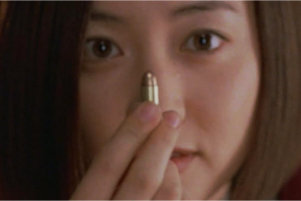Reviews and notes
FESTIVALS:
2001 Berlin, Deauville, Seattle, Karlovy Vary, Jerusalem, Helsinki, Warsaw
2003 Febio, Florence
2019 Harvard Film Archive
Park Chan-wook’s career was launched with the blockbuster success of his timely and taut thriller set on the tense demilitarized zone separating North and South Korea.
Joint Security Area follows the urgent investigation of the mysterious death of two North Korean DMZ guards and the South Korean soldier immediately suspected. Park’s meticulous attention to accuracy extends to the film’s expanded set of the DMZ — recreated at tremendous expense just miles away from the actual site — as well as the methodical procedures of the Swiss Korean UN investigator tasked with untangling the complex web of friendship and betrayal uncovered as she learns more about the soldiers and the strange symbolic space they inhabit and dutifully guard with their lives. With its questioning of dehumanizing military authority
Joint Security Area recalls classic military dramas such as
The Caine Mutiny (1954) or
Breaker Morant (1980). Park, however, brings another more intimate and poignant dimension into his depiction of the soldiers themselves whose loneliness and confusion embody the strange miasma and ominous immobility of the Cold War stalemate still dividing the Korean peninsula.
- Harvard Film Archive.
For the second year in a row, the Korean film industry has struck gold with a movie about North Korea. Many expected
Joint Security Area (or
JSA) to do well at the box office, given the current level of interest in North Korean affairs, but it has done much more than that, spawning headlines and breaking box-office records with ease. The film drew close to half a million viewers in Seoul alone its first week. On the following Saturday it set a one-day box office record, drawing 104,000 viewers in the capital. It broke the one million admissions mark in only 15 days - last year it took
Shiri 21 days to reach the same mark. By early 2001 it had become the best-selling film in Korean history (though it was eclipsed by
Friend a few months later).
Joint Security Area, Park Chan-wook's film, opens with a shooting in the truce village of Panmunjom which leaves two North Korean soldiers dead and one South Korean soldier wounded. With each country giving conflicting reports on what happened, the Neutral Nations Supervisory Commission (NNSC) is asked to send in a Swiss military officer to conduct an investigation. After her arrival, however, she finds that no one is willing to talk to her, and the soldiers involved all seem to be hiding some secret.
JSA is described as a mystery/human drama, and its structure is clearly divided into two parts: the investigation by Korean-Swiss Major Sophie Jean, and an extended flashback to the incident between the soldiers. I think most would agree that the film's biggest strength is the flashback, with actors Song Kang-ho and Lee Byung-heon excelling in their roles. This part of the film also features some breathtaking cinematography for the scenes that take place along the Demilitarized Zone.
The mystery element contains less tension, particularly if the viewer knows too much about the plot beforehand. Attention is focused not so much on what happened, but why. This part also contains a large number of scenes in English. Nonetheless it has been noted by critics and audience members alike for its rare casting of a female actor (Lee Young-ae) in a non-romantic part.
The producers of the film spared no expense in recreating the setting around Panmunjom. Since shooting at the actual site would obviously not be permitted, Myung Film built a 90% replica of the village of Panmunjom at a cost of some $800,000. The site can be visited to this day at the Seoul Cinema Complex.
JSA is also notable for being the first Korean film ever to be shot on Super 35mm film, a special format used in some Hollywood blockbusters that allows for a wide screen (2.35:1) with very clear definition.
The film has won more or less unanimous praise from every sector of Korean society, with one exception: the army. Many in the military have derided the film as pure fantasy, based on an event which could never happen in real life (probably true). In a bizarre incident on September 26, twenty older members of the JSA Veterans' Association stormed into the office of Myung Film, breaking windows and physically threatening the employees of the company. They demanded that the production company issue a public apology to the army and insert notices at the beginning and end of the movie stating that it is a work of fiction. After four hours, the employees of Myung Film acquiesced, and despite vocal objection from the film industry, the group's demands are being met.
Some have compared this film to
Shiri because of its superficial resemblance, but it really is a much different work. As relations with North Korea change and the two nations draw closer together, this film perhaps serves best as a record of South Koreans' fears and hopes for reconciliation.
- Darcy Paquet, koreanfilm.org, 9 September 2000.
Back to screening list

